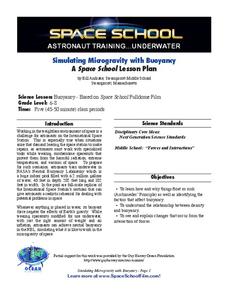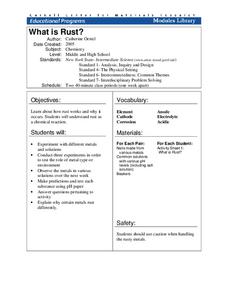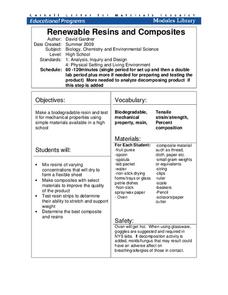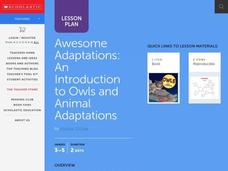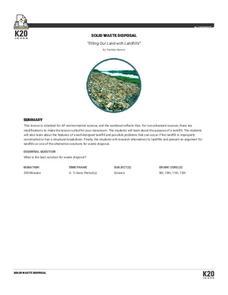McAuliffe-Shepard Discovery Center
Global Warming in a Jar
This well-organized lab activity introduces earth science pupils to the greenhouse effect. They will set up two experiments to monitor temperatures in an open jar, a closed jar, and a closed jar containing water. Ideally, you would have...
Curated OER
Grow an Alum Crystal
What an exciting lab experiment to conduct with your high school chemistry class! Crystals are formed naturally in the environment. However, allow your blossoming chemists to create their own unique crystals using alum and water. You may...
Florida International University
Simulating Microgravity with Buoyancy
How do astronauts know how to live and work in a weightless environment? It doesn't come naturally! Junior physicists conduct experiments to examine the link between buoyancy and microgravity. Each activity illustrates a different aspect...
Cornell University
What Is Rust?
Why do metals rust differently? Scholars experiment with metal combinations in a hands-on activity. They create unique environments with different metals and compare the rate and amount of rust for each.
Cornell University
Renewable Resins and Composites
Merge chemistry with environmental science to study biodegradable materials. An engaging activity allows learners to experiment with different resin concentrations and composites. Through experimental tests, scholars test their creations...
Science Matters
Eruptions and Volcano Types
The Mammoth Lakes area regularly releases warnings to hikers and skiers to be careful because melting snow releases trapped gases from volcanic vents. The 17th lesson in the 20-part series opens with a demonstration of carbon dioxide...
Florida International University
Designing an Autonomous Underwater Vehicle (AUV): Concepts in Lift, Drag, Thrust, Energy, Power, Mass, and Buoyancy
Engineer an autonomous underwater vehicle (AUV) to study concepts of physics. Using household materials, collaborative groups design and build an AUV and then test Newton's Laws of Motion as they apply them in underwater environments...
Virginia Department of Education
Electricity and Magnetism
Take charge of your class and provide them with an electrical experience! Individuals investigate the basic principles of electricity and magnetism by creating a model to test electric current and the amount of electricity generated....
Scholastic
Discussion and Dissection of an Owl Pellet
Young scientists get the chance to dissect pellets "owl" by themselves to determine the owls environment and nourishment. This is the third part of a three-part series.
Scholastic
Awesome Adaptations
Engaged learners discover how an owl beak works and how animals adapt to their environment. This task is part one of a three-part series.
Curated OER
AP Biology Daily Lesson Plans Curriculum
Searching for exciting lesson plans filled with hands-on activities to use in your traditional classroom environment? Look no further! This set of lesson plans for AP Biology covers topics from genetics to evolution, botany to ecology,...
Curated OER
Open Inquiry Using C. elegans
Ever wondered what motivates a roundworm? Introduce your biology class to C. elegans, a non-parasitic model organism that can help them understand behavioral stimuli. Paired pupils design an experiment to test the worm's reaction to...
Beyond Benign
Daphnia Bioassay LD50
De-icing materials may have a harmful effect on our environment; have your class perform an experiment to test the nature of these effects. Scholars monitor the survival rate of a sample of daphnia as the concentration of a de-icing...
Alabama Wildlife Federation
Itsy Bitsy Spider
Bring the outside in to make observations in a controlled environment. Pupils learn about predator-prey relationships with spiders firsthand. They first construct a spider habitat and then feed the spider insects to make observations...
Curated OER
Investigating the Response of Worms to Soil Improvers
The worms crawl in, the worms crawl out, but do they care what soil is all about? Find out in an easy and fun controlled experiment. Have your young biologists hypothesize, test, and draw conclusions about which type of soil worms...
Curated OER
Get a Leg Up
Traveling through space is an amazing experience, but it definitely takes a toll on the body. After reading an article and watching a brief video, learners perform an experiment that simulates the effects of zero gravity on the human body.
Howard Hughes Medical Institute
Got Lactase? The Co-Evolution of Genes and Culture
Does the human body evolve as quickly as human culture? With a stellar 15-minute video, explore the trait of lactose intolerance. Only about 1/3 of human adults seem to still have the enzyme lactase and therefore, the ability to digest...
American Physiological Society
Drug the Water Flea
This is a flea. This is a flea on drugs. Any questions? Your class will have questions aplenty during an impactful experiment. Lab groups get to know Daphnia magna, the humble water flea, and study the effects of stimulants and...
Science 4 Inquiry
Enzymes in Action
Enzymes play a role in almost every function in the human body. Scholars explore three variables related to the use of enzymes. They observe a catalase reaction, experiment with substrates, and examine reactions rates.
K20 Learn
Filling Our Land with Landfills: Solid Waste Disposal
New ReviewThough it comprises only 5 percent of the world's population, the US generates 40 percent of the world's waste. Scholars learn about landfills, their safety, and other solid waste methods. They use experiments and research to learn more....
Marine Institute
Water Pollution
Sixth graders investigate the various types of pollutants found in water and ways to help prevent water pollution. Through a hands-on experiment, students create samples of polluted water by mixing water with vegetable oil, dirt, and...
Kenan Fellows
Making Connections with Water Quality
What's in your water? And, why is water quality so important? Enhance your class's level of water appreciation through a lesson that demonstrates the necessity of water quality. Environmental enthusiasts explore the EPA's Clean Water...
Virginia Department of Education
Molar Heat of Fusion for Water
How can you describe heat of fusion in a way the class understands and relates the importance of this concept to present day issues? In this third lesson of the series, learners conduct an experiment, demonstrating the flow of heat...
Beyond Benign
Synthesis and Analysis of Biodiesel
Fossil fuels are non-renewable resources and have become crucial to the livelihood of countless individuals. Young chemists investigate an alternative method of generating energy by performing a series of activities that lead to the...
Other popular searches
- Environment Science
- Environmental Science
- Environmental Science Games
- Environmental Science Unit
- Ap Environmental Science
- Living Environment Science
- Environmental Science Energy
- Environmental Science Maps
- Environment Science Labs
- Land Use Environment Science
- Environment Science Dilemma
- Environment Science Graphing




